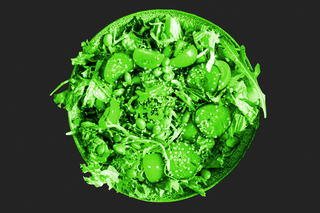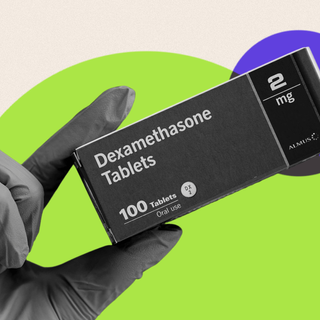
Plant‑Based Diet Made a Person’s Severe Migraine ‘Disappear,’ Leaving Experts Intrigued
Researchers are calling for more studies around the link between migraines and food to explore treatment options.

A 60-year-old man was able to “completely eliminate” his severe migraines after suffering for over a decade. What helped him? A good old, plant-based diet comprising “dark-green leafy vegetables, fruits, beans, oatmeal, and a daily green smoothie.” Yes, experts are baffled at how well that worked too.
Published in BMJ Case Reports, a case study on his miraculous recovery notes that he started seeing results within just a month of switching to a plant-based diet seven years ago. He has been headache-free ever since.
“Before I changed my diet, I was suffering six to eight debilitating migraines a month, each lasting up to 72 hours. Most days, I was either having a migraine or recovering from one… I was desperate,” the individual, who had been dealing with severe headaches for 12 years, reported. The condition left him suffering from chronic headaches for about 18 to 24 days every month.
Prior to this, he had been prescribed “preventive and abortive migraine medications.” He also tried yoga and meditation. But nothing had worked.
“However, within one month of beginning a nutrient-dense plant-based diet… I was able to get off both medications,” he noted, adding, “I can’t even remember the last time I had a headache. I am no longer a prisoner in my own body. I have my life back.”
Related on The Swaddle:
Scientists Simulated a Roller Coaster Ride to Understand What Causes Migraine
The acronym ‘P.O.U.N.D.’ is often used to describe what migraines feel like — P stands for pulsating pain; O for one-day duration of severe untreated attacks; U for unilateral, i.e., one-sided, pain; N for nausea and vomiting; and D for disabling intensity. Research suggests that migraines constitute the third most common disease in the world with an estimated global prevalence of 14.7% — affecting around 1 in 7 people.
Some doctors are now inclined to believe that a plant-based diet might truly prove to be a solution for people living with migraines. However, many others are cynical about a specific kind of diet working for the vast majority of migraine patients from around the globe.
“This is a case report and therefore it is impossible to generalize the finding,” Gunter Kuhnle, a professor of nutrition and food science at the University of Reading in the U.K., told The Guardian.
However, he does believe that diet can “play an important role in the management of many diseases” — something that certainly has the potential to apply to migraines since it’s been associated with triggers like changing weather, fluctuating sleep patterns, mental or emotional stressors, medications and — wait for it — diets. But this also begs the question: if the triggers for different people can be so varied, can there truly be a single cure?
And as Duane Mellor, a registered dietitian and senior teaching fellow at Aston University pointed out, how can we possibly know if it really was the diet that worked wonders? “…it could be an effect of the diet which was started, but also it could be a response to something they were no longer eating or even just the behavioral effect of a change in diet which may have led to the reduction in migraines,” Mellor says.
Related on The Swaddle:
Migraine Patients Often Suffer from ‘Osmophobia’ or the Fear of Smells: Scientists
Having said that, given the sheer number of people suffering from migraines globally, if switching one’s diet can truly help even a segment of patients, perhaps it’s a link worth exploring. Moreover, as the study authors noted, there is a growing body of research, especially on plant-based diets, that suggests it can help migraine patients.
“Over the past two years, I have averaged just two migraine days per month — down from 18. For the first time in years, I have my life back,” Leila Dehghan, a medical professional herself, who had been suffering from migraines since she was nine, wrote of her experience switching to a plant-based diet. “Throughout my childhood, I was dragged to more doctors and had more scans, but the treatment options remained the same: painkillers and patience.”
Research also suggests that processed foods can be extremely high in migraine-triggering substances — perhaps, the reason why plant-based diets work for many. Moreover, magnesium content in foods like dark leafy greens and avocado are also believed to be helpful in reducing migraines, especially for female patients. And migraines are more common in women compared to their male counterparts.
But even though scientists recognize the link between one’s dietary choices and the severity or frequency of migraines they experience, the same diet may not be the solution for everyone. Some experts believe foods rich in omega-3 fatty acids — like mackerel and salmon — help reduce migraines for many. And that’s certainly not plant-based.
However, what seems to be clear is that there’s some link between food and migraines. What exactly it is, scientists don’t seem to quite know yet. Nonetheless, as Kuhnle notes, “migraine is a debilitating condition and it is important to find ways to treat and manage it.” One of the ways forward, perhaps, is to understand the link better.
Devrupa Rakshit is an Associate Editor at The Swaddle. She is a lawyer by education, a poet by accident, a painter by shaukh, and autistic by birth. You can find her on Instagram @devruparakshit.
Related


Why Anxiety Can Sometimes Make People Feel Unsafe Even in Safe Environments
